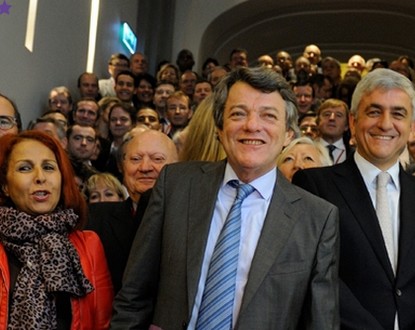The birth of this new coalition, with each adhering party maintaining its autonomy for the time being, is the novelty of the French political landscape. Will it become the leading party in France, as hoped by its founder Jean-Louis Borloo, or simply a loyal ally of the UMP, as naturally expected by the leaders of that party? Time will tell.
Curiosity and interest will follow its presence in Nice and its nearby region, which promises to be intriguing concerning the political balances of the ruling power. Yet it was in Paris, at the Salle de la Mutualité, that the UDI (Union of Democrats and Independents) was inaugurated on October 21, 2012.
Some pessimistic minds may perceive this birth as yet another rebound in the multiple attempts to recreate a genuine centrist political force in France. It must be admitted that the history of the political center in our country is not a smooth journey.
In reality, this date represents the true founding act of a new political party with a promising future.
The assembly at the Mutualité will remain in centrist memories for its number of participants (over 3,000 people), the presence, and the speeches of numerous personalities.
It was Hervé Morin, president of the Nouveau Centre, who humorously opened the day: “Thank you, Jean-Louis (Borloo), for putting the little centrist frogs back in the same box!” In his speech, he emphasized the importance of creating the UDI, “the last chance to revive a political formation in the center and center-right.”
The benevolent shadow of the UDF undoubtedly hovered over the Mutualité that Sunday: a broadcast within the hall of a speech by Valéry Giscard d’Estaing, a speech by his son Louis Giscard d’Estaing who reminded the assembly of Raymond Barre’s phrase, “France must stop spending more, working less, and borrowing the difference,” and the presence in the front row of Simone Veil. All the historical figures of centrism’s golden age were present to recall the history of this political family and its contributions to French society (abortion rights, contraception, voting age of 18, audiovisual independence…).
Numerous personalities from the UMP or MoDem also supported the creation of the UDI: Jean-Marie Cavada, Jean Arthuis, Maurice Leroy, Thierry Breton, Hervé de Charette, Jean-Christophe Lagarde, Olivier Henno, Jean-Marie Bockel, Valérie Létard, Jean-Marie Vanlerenberghe, Anne Sattonnet, Arlette Fructus, Alain Dolium, Michel Barnier, Rama Yade, Chantal Jouanno…
Jean-Louis Borloo clearly stated the ambition of the Union of Democrats and Independents, “to make this political formation the leading party in France.” This “UDF of the 21st century” encompasses the Radical Party led by Jean-Louis Borloo, the Nouveau Centre (Hervé Morin), the Centrist Alliance (Jean Arthuis), the Modern Left (Jean-Marie Bockel), European Democratic Force (Jean-Christophe Lagarde), Territoires en mouvement (Jean-Christophe Fromentin), and the National Center of Independents and Peasants (Gilles Bourbouleix).
In Parliament, the UDI already comprises 30 deputies and 32 senators who form autonomous groups in the National Assembly and the Senate.
The UDI has the merit of clearly positioning itself on the political spectrum. Independence should not be confused with isolation. Bipolarization should not be confused with bipartisanship. Like in all major democratic countries, there are two main political currents, symbolized by the terms “left” and “right.” However, this natural bipolarization should not lead to the sole existence of two major political parties. The Union of Democrats and Independents represents an independent formation that fits into a clear coalition with the republican right.
The UDI upholds values that the center and radicalism have championed for years. At the forefront of these values are naturally humanism, European federalism, independence, responsible ecology, respect for others, listening, dialogue and tolerance, individual responsibility, merit, and the fight against “Maginot Lines in society and territories.”
On the programmatic front, the priority areas are: revamping a more integrated Europe, significantly reducing corporate social charges, a more economical state, genuine control of public accounts, controlled decentralization, an educational revolution promoting apprenticeships and work-study programs, the defense of responsible ecology conducive to sustainable employment…
The speeches at the launch of the UDI naturally addressed all these topics. A few were particularly highlighted:
Europe. What other political formation, whether on the right or the left, can claim such homogeneity on such a crucial subject? At a time when Europe is honored with the Nobel Peace Prize, how can we not remember the path traversed in this union of peoples who in the past endured many tragedies? I will quote a phrase echoed by Michel Barnier, “peoples who do not know their history are bound to relive it.”
Competitiveness. In his speech, Thierry Breton called for an assessment of the causes of competitiveness loss in recent years: fiscal instability, tax burden on businesses and households, a lack of control over public spending…
Ecology. Chantal Jouanno, whose surprise arrival was greeted with genuine applause, delivered a brilliant plea for the politics of ideas, free ideas. She tirelessly advocates for contemporary ecology, an ecology of growth, an ecology that is not a luxury that can wait.
The conclusion of the UDI launch naturally fell to Jean-Louis Borloo, who made a slip warmly applauded by a standing crowd: “you asked me to build this country… I mean to build this party!” before declaring, “the UDI is born, it is good news for all who want a France open to Europe, the world, for freedom and humanism.”


